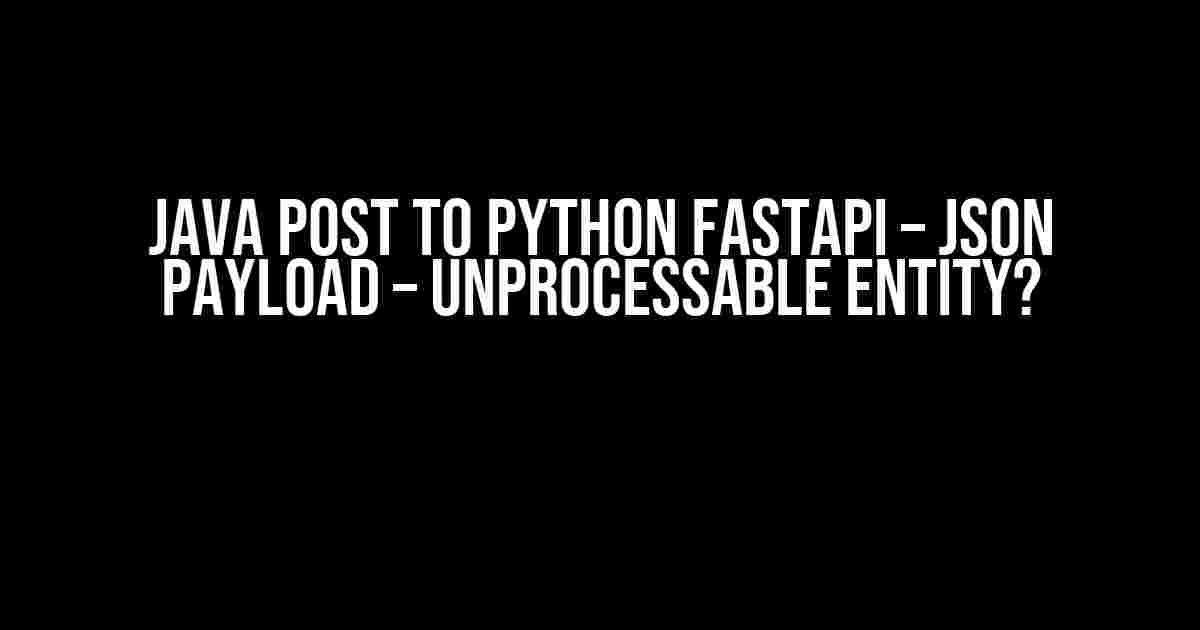Are you tired of dealing with errors when trying to send a JSON payload from a Java application to a Python FastAPI endpoint? You’re not alone! In this article, we’ll dive into the world of Java-Python integration and explore the common pitfalls that lead to the dreaded “Unprocessable Entity” error. Buckle up, and let’s get started!
The Problem: Unprocessable Entity
When sending a JSON payload from a Java application to a Python FastAPI endpoint, you might encounter the “Unprocessable Entity” error. This error occurs when the FastAPI endpoint receives a request that it can’t process due to invalid or malformed data. But don’t worry; we’ll break down the possible causes and solutions to get you back on track.
Common Causes of Unprocessable Entity
- Invalid JSON payload structure
- Mismatched data types between Java and Python
- Missing or incorrect headers
- Serialization and deserialization issues
Step-by-Step Guide to Fixing the Unprocessable Entity Error
Let’s walk through a step-by-step guide to fix the Unprocessable Entity error and ensure seamless communication between your Java application and Python FastAPI endpoint.
Step 1: Verify the JSON Payload Structure
In Java, create a JSON payload using the Jackson library or another JSON serialization library of your choice. Make sure to use the correct data types and structure to match your Python FastAPI endpoint’s expectations.
import com.fasterxml.jackson.databind.ObjectMapper;
public class JavaApp {
public static void main(String[] args) {
// Create a JSON payload
ObjectMapper mapper = new ObjectMapper();
String jsonPayload = mapper.writeValueAsString(new Payload("John Doe", 30));
// Send the JSON payload to the FastAPI endpoint
// ...
}
}
class Payload {
private String name;
private int age;
public Payload(String name, int age) {
this.name = name;
this.age = age;
}
public String getName() {
return name;
}
public int getAge() {
return age;
}
}
Step 2: Send the JSON Payload to the FastAPI Endpoint
Use a Java HTTP client library, such as OkHttp or Apache HttpClient, to send the JSON payload to the FastAPI endpoint. Make sure to set the correct headers, including the “Content-Type” header set to “application/json”.
import okhttp3.OkHttpClient;
import okhttp3.Request;
import okhttp3.RequestBody;
public class JavaApp {
public static void main(String[] args) {
// Create an HTTP client
OkHttpClient client = new OkHttpClient();
// Set the request URL and headers
Request request = new Request.Builder()
.url("http://localhost:8000/endpoint")
.post(RequestBody.create(jsonPayload, MediaType.get("application/json")))
.build();
// Send the request
client.newCall(request).execute();
}
}
Step 3: Define the FastAPI Endpoint
In Python, define a FastAPI endpoint to receive the JSON payload. Use the correct data types and model definitions to match the Java payload structure.
from fastapi import FastAPI, HTTPException
from pydantic import BaseModel
app = FastAPI()
class Payload(BaseModel):
name: str
age: int
@app.post("/endpoint")
async def receive_payload(payload: Payload):
try:
# Process the payload
print(f"Received payload: {payload.name} - {payload.age}")
return {"message": "Payload processed successfully"}
except Exception as e:
raise HTTPException(status_code=422, detail="Unprocessable Entity")
Step 4: Add Error Handling and Debugging
In both Java and Python, add error handling and debugging mechanisms to catch and display any errors that might occur during the request-response cycle.
// Java error handling
try {
client.newCall(request).execute();
} catch (IOException e) {
System.err.println("Error sending request: " + e.getMessage());
}
// Python error handling
try:
# Process the payload
print(f"Received payload: {payload.name} - {payload.age}")
except Exception as e:
print(f"Error processing payload: {e}")
raise HTTPException(status_code=422, detail="Unprocessable Entity")
Troubleshooting Tips and Tricks
If you’re still encountering issues, here are some additional tips and tricks to help you troubleshoot the Unprocessable Entity error:
- Verify the JSON payload structure and data types in both Java and Python.
- Use a tool like Postman or cURL to test the FastAPI endpoint and verify the request and response.
- Check the server logs for any errors or exceptions.
- Use a JSON validation tool, such as JSONLint, to validate the JSON payload.
- Add debug logging and print statements to both the Java and Python code to track the request-response cycle.
| Error | Solution |
|---|---|
| Invalid JSON payload structure | Verify the JSON payload structure and data types in both Java and Python. |
| Mismatched data types | Use the correct data types in both Java and Python to match the expected payload structure. |
| Missing or incorrect headers | Set the correct headers, including the “Content-Type” header set to “application/json”, in the Java HTTP client. |
| Serialization and deserialization issues | Use the correct serialization and deserialization libraries and techniques in both Java and Python. |
Conclusion
In conclusion, the Unprocessable Entity error can be a frustrating obstacle when integrating Java and Python applications. However, by following the steps outlined in this article, you can identify and fix the underlying causes of this error and ensure seamless communication between your Java application and Python FastAPI endpoint. Remember to verify the JSON payload structure, use the correct data types, set the correct headers, and add error handling and debugging mechanisms to catch any errors that might occur.
With these tips and tricks, you’ll be well on your way to resolving the Unprocessable Entity error and building robust and reliable Java-Python integrations. Happy coding!
Frequently Asked Question
Get the inside scoop on solving the pesky “Unprocessable entity” error when sending a Java POST request to a Python FastAPI with a JSON payload.
What’s causing the “Unprocessable entity” error in my Java POST request to Python FastAPI?
This error usually occurs when the JSON payload sent from Java is not being properly parsed or validated by FastAPI. Check if your JSON payload is correctly formatted and adheres to the expected schema defined in your FastAPI endpoint.
How do I ensure my JSON payload is correctly formatted and serialized in my Java application?
Use a JSON serialization library like Jackson or Gson to convert your Java objects to JSON. Make sure to configure the library correctly, and use the correct annotations to specify the JSON property names and data types.
What’s the best way to define the expected JSON schema in my FastAPI endpoint?
Use Pydantic models to define the expected JSON schema. Create a Pydantic model that matches the JSON payload structure, and use it as a parameter in your FastAPI endpoint. This will enable automatic validation and parsing of the JSON payload.
How can I debug the JSON payload being sent from my Java application to FastAPI?
Use a tool like Postman or cURL to inspect the JSON payload being sent from your Java application. You can also enable debug logging in your FastAPI application to see the received JSON payload and any errors that occur during parsing or validation.
What’s the deal with JSON payload encoding and decoding in Java and Python?
Make sure that the JSON payload is encoded correctly in your Java application using UTF-8 encoding. On the Python side, ensure that FastAPI is configured to decode the JSON payload using the same encoding. This will avoid any encoding-related issues that might cause the “Unprocessable entity” error.



